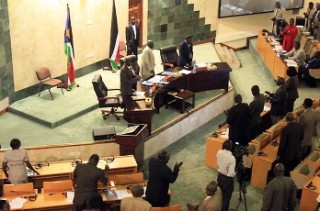S. Sudan’s security bill to become law after 30-day review period lapses
March 15, 2015 (JUBA) – South Sudan’s controversial security bill, which was returned to parliament for revision late last year, could eventually become a law after the 30 days permitted by the constitution for its review passed without amendments.

He said the bill becomes a law if the president has not signed it within 30 days after the receipt following passage by parliament and when comments or observations have been made in writing.
“If the president responds and sends back the bill to the parliament, the bill is introduced again to the house as if it were a new bill and process starts again,” Unango exclusively told Sudan Tribune.
According to the minister, the National Security Bill had overstayed in the country’s national legislative assembly without new processes and procedures being initiated after it returned before lawmakers.
“The President sent back it to Parliament for review and it has overstayed. Also know that 33 days had elapsed when it was sent to the parliament from the office of the president. By law, it was already a law because when the President sent the bill back to Parliament 33 days had elapsed since his receipt of it,” said the justice minister.
“Therefore, according to the constitution it becomes law,” he added.
South Sudanese activist Edmund Yakani urged the country’s parliamentary committee on security, defense and public order to make some clarifications on this matter.
“This is an important bill that require enactment following democratic principles and values,” said Yakani in an email sent to Sudan Tribune on Monday.
Last year, local and international human right bodies urged president Kiir to veto an “abusive” security bill that gives sweeping powers to the National Security Service (NSS).
There are widespread concerns that the security bill, passed on 8 October, gave NSS officers sweeping powers, including to arrest and detain suspects, yet the Transitional Constitution permits NSS to focus on “information gathering, analysis and advice”.
(ST)
